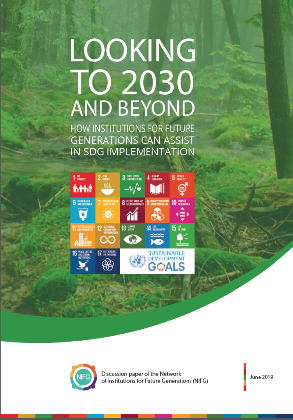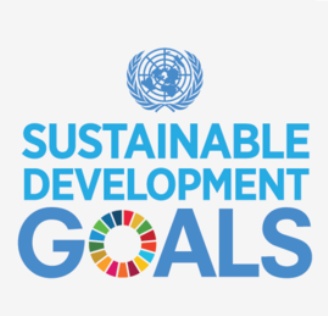About - Network of Institutions for Future Generations
About
The Network of Institutions for Future Generations is an independent, non-formal network of institutions worldwide for the protection of the interests of future generations. The NIFG's primary goal is the sharing of knowledge and dissemination of best practices of its member institutions engaged in the promotion of responsible, long-term governance, taking into consideration the wellbeing of our descendants and their natural environment. The NIFG consists of a diversity of institutions, highlighting the need as well as the opportunity to safeguard the interests of future generations through different means and across various disciplines.
Our goals
The need to protect the interests of those yet to be born was recognized along with the realization of accelerating destructions of human actions on the natural world in the last decades, affecting the life of succeeding generations in fundamental ways. These long-term impacts include environmental, social and economic changes as well, such as alterations to climatic conditions, radioactive pollution, ocean acidification or massive indebtedness of future generations. The Rio+20 Earth Summit in 2012, recognizing the need to promote solidarity between generations, invited the UN Secretary General Ban Ki-moon to produce a report on issues concerning intergenerational justice.
His Report, "Intergenerational solidarity and the needs of future generations" established that the concept of intergenerational solidarity is embedded in the idea of sustainable development, and is a universal value of humanity. Therefore, he invited the High Level Political Forum to consider the most suitable mechanisms to promote intergenerational equity and sustainable development on the UN level. He also introduced several national institutions that got established or have launched effective programs for the representation and protection of the needs of future generations, which can serve as important models for the further promotion of intergenerational solidarity in national, regional and global levels.
The role of these institutions is wide-ranging: they enhance long-term thinking in governance, as well as create a medium which is capable of incorporating the basic principles of intergenerational equity into the political and social life of the state. These principles are the conservation of options, quality and access to resources and opportunities for future generations. They try to influence legislative and political decision-making mechanisms by "bringing future generations to the negotiating table".
The NIFG brings together the institutions highlighted in the Report, as well as other establishments from around the world, who undertake similar roles or are interested in creating institutional means for the protection of future generations in their own countries.
Our cooperation has a three-fold aim:
- to share institutional best practices among its members for the development of effective means and practices,
- to provide innovative ideas for other establishments working on various levels worldwide,
- and to channel outside perspectives, successes and lessons learned into the work of already existing bodies.
Therefore, we invite you to take a look at the set-up, mandate, and best practices of our member institutions under the "Work" section, and provide your own institutional experiences by joining us here.
This online platform
This website aims to provide a surface for sharing of knowledge and experience on institutional solutions for the protection of the interests of future generations. It has a strong focus on the institutions, their make-up, how they are composed, and what their roles and activities are. It intends to compare diverse solutions and structures for institutionalizing the task of promoting intergenerational solidarity, highlighting the level of engagement and activity thereof. Its goal is also to serve as a reference point for scholars and practitioners for recent developments, events and news sharing, as well as a place for online discussion.
As this site intends to serve the wider audience with interesting case studies, the most important lessons learned, and practices that contributed to the protection of our posterity, we hope to disseminate effective law-, and policy-making tools and provide models of implementation for others at the local, national, regional and global levels.
Our history
According to the "Future We Want" outcome document of the Rio+20 Summit, the promotion of sharing of experiences and best practices to the implementation of sustainable development was one of the tasks of the High Level Political Forum. Recognizing the significance of this function, as well as on the basis of its special responsibility to promote the needs of future generations as outlined in the Report of the UN Secretary General, the Hungarian Ombudsman for Future Generation decided to organize a conference to bring together national institutions mentioned in the Report.
The event entitled "Model Institutions for a Sustainable Future" was held on 24-26 April 2014 under the patronage of János Áder, President of Hungary. The event aimed to contribute to a closer cooperation between the national institutions playing a pioneering role in the implementation of sustainable development and intergenerational solidarity at the national level. The conference focused on understanding the unique characteristics of the relevant national bodies as well as the legal principles and processes underlying their work. Following the presentation of the selected model institutions, panel discussions were centring on the different constitutional and environmental law principles underlying the work of such bodies both from a practitioner and an academic perspective. Panels encouraged discussions among participants of different expertise providing opportunities to link theory to practical implementation. Owing to the recent slow progress of international law in this area, a deeper cooperation between national institutions committed to protecting the interests of future generations can potentially contribute to the development of international legal principles and shape relevant state practice under the auspices of the United Nations.
At this event, many participants expressed their wish to formalize the cooperation of the present institutions by establishing a network of national institutions for future generations. To this end, participants adopted the Budapest Memorandum, for the spread of institutional solutions for safeguarding the needs of future generations and to call upon Member States to appoint a representative for future generations at the UN level as well.
Budapest Memorandum
adopted at the Conference of Model Institutions for a Sustainable Future
held in Budapest, 24-26 April 2014
We, the representatives of independent offices or parliamentary bodies serving to safeguard the needs of future generations and named by the UN Secretary-General in its Report entitled ‘Intergenerational Solidarity and the Needs of Future Generations' as possible models to institutionalize concern for future generations, together with the representatives of further initiatives and non-governmental organizations pursuing the same goal, as well as members of the academia deeply committed to the protection of the needs of future generations bearing in mind the principle of intergenerational equity,
Drawing valuable inspirations from the presentations of the conference and recognizing the historical responsibility of present generations towards those yet to come in terms of safeguarding the natural environment, the natural resources and the climate together with our cultural heritage in order to ensure our successors' freedom and capability to make their own choices,
Acknowledging the special responsibility entrusted to the model institutions for promoting the protection of living conditions for our descendants with a special regard to the unprecedented magnitude and the irreversible nature of the damage now being done,
Sharing a common conviction on the pivotal importance of strengthening and embedding forward-looking long-term approaches in the current social model and policy-making and governance in order to ensure the effective realization of sustainable development from an environmental, social and economic aspect in line with the core principles such as prevention and precaution,
With the ultimate goal of fostering intergenerational solidarity and equity – in accordance with the letter and the spirit of the Stockholm Declaration, the Rio Declaration and the outcome document adopted at Rio+20 entitled ‘The Future We Want' – as well as strengthening the sense of responsibility towards future generations,
Noting the utmost importance of the varying and well-established experience and expertise of non-governmental organizations active in this field as well as the academic knowledge elaborated with respect to the underlying theoretical and scientific principles that underpin the guardianship of the needs of future generations,
Bearing in mind that gender equality and active participation of children are of vital importance for realizing sustainable development and for promoting the needs of future generations as well as eradicating poverty and social injustice,
Convinced that intergenerational equity cannot be achieved without intragenerational equity,
Recalling ‘The Future We Want' outcome document and recognizing that each country faces specific challenges to achieve sustainable development and the special situation of the vulnerable groups and developing countries should be respected in this regard,
Stressing the importance of the participation of indigenous peoples in the achievement of sustainable development,
Convinced that the establishment of institutions promoting the needs of future generations at all levels including national, regional as well as the global level would fundamentally foster environmental consciousness and sustainable development and would raise awareness of the long-term consequences of our present-day actions,
Acknowledging that no nation or region can tackle alone the global environmental challenges and that thus, sustainable development and the guardianship of the needs of generations to come can be best achieved through international cooperation with due respect to cultural and judicial diversity,
Supporting, in line with the findings of ‘The Future We Want' resolution, and the UN Secretary-General report, ‘Intergenerational solidarity and the needs of future generations', the call for a promotion of the basic interests of future generations under the auspices of the UN,
Approving the proposal for a target in the system of Sustainable Development Goals aiming at establishing innovative and powerful institutions both at the UN and the national level for the protection of the needs of future generations, and by also upholding the principles of full transparency, accountability and participation,
Taking note of the recommendations on national and subnational governance reforms towards implementing the post-2015 development agenda elaborated by the Sustainable Development Transition Forum that was recently hosted by the UN Office for Sustainable Development,
Having considered the need for a regular and comprehensive professional network for sharing relevant experiences and best practices relating to the various aspects of this field,
With the goal of establishing a global partnership among the nationally established bodies for guarding the needs of future generations,
1. We strongly support the spread of institutional solutions for safeguarding and promoting the needs of future generations as well as the fostering of sustainable development on the national, subnational and the UN level. For this reason we are also committed to actively encourage and help Governments and Parliaments to begin effective reforms in governance and decision-making that would help them to better address present-day realities and future challenges. We are also committed to help prospective institutions in initiating and enabling capacities as a guardian for the needs of future generations.
2. We strongly support the UN Secretary-General's proposal to establish a High Commissioner for Future Generations at the UN level and call upon Member States to appoint such a representative, mandating its role and tasks, in order to ensure a long term policy coherence to safeguard the needs of future generations.
3. We endorse the proposed Sustainable Development Goal target to establish innovative and powerful institutions, both at the national and the UN level, for the protection of the basic interests of future generations. Under the scope of this target we recommend facilitating global partnership among the nationally established bodies and encouraging their cooperation as well as providing – upon request – assistance to governments to implement this target.
4. We consider it an unprecedented opportunity and a unique chance to establish a network among the present participants for regular contact the exchange of information, experience and best practice on existing and novel solutions both from a theoretical and a practical point of view. In order to secure the continuation of the present cooperation, the participants welcome the offer of the Hungarian Ombudsman's Office to gather and circulate information among the members to explore the further ways and means towards the network's further operation.
Budapest, 26 April 2014
See the full text of the Memorandum and the list of signatories in a Pdf format.
[1] Göpel - Guarding our Future, 2011
-

Committee for the Future - Finland
-

Parliamentary Advisory Council on Sustainable Development - Germany
-

Commissioner of the Environment and Sustainable Development - Canada
-

Commissioner for Future Generations - Wales
-

Parliamentary Commissioner for the Environment - New Zealand
-

Former Commissioner for Future Generations - Israel
-

Ombudsman for Children - Norway
-

Ombudsman for Future Generations - Hungary
-

Commissioner for Sustainability and the Environment - Australia Capital Territory












